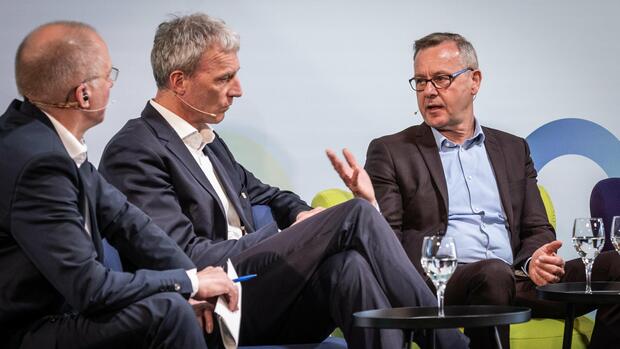Salzgitter It should now go quickly with the construction of a network for the supply of hydrogen. At the beginning of the week, the Federal Ministry of Economics under Minister Robert Habeck specified its plans for this after a long period of consideration. The operators of the long-distance gas network play a key role in this.
They can probably make a proposal to the responsible Federal Network Agency by the summer as to what a basic network could look like. That said Ulrich Benterbusch, Managing Director of the long-distance gas network operator Gascade, on Wednesday at the Handelsblatt Hydrogen Summit in Salzgitter. He emphasized: “We cannot depend on a federal state.”
Criticism of too small “hydrogen launch grid”
Initially, a network with a length of 1700 kilometers is to be created. Significant parts of the new network are to consist of repurposed natural gas pipelines. At the hydrogen summit, Benterbusch warned that the hydrogen network should not be too small: “Right from the start, we have to design the capacity in such a way that it is sufficient in the long term.” A 1700-kilometer network is far too small. Without adequate infrastructure, the Gascade boss explained, “nothing will happen here in Salzgitter or anywhere else”.
The operators of long-distance gas pipelines have been working intensively for several years on what a starter network could look like. They presented their first ideas at the beginning of 2020. Your plans are likely to be changed in cooperation with the Federal Network Agency. One point of criticism: According to previous plans, the hydrogen start-up network will initially primarily serve north-west Germany. The south will follow later. The Bavarian economy had heavily criticized it.
From left to right: Klaus Stratmann (Handelsblatt), Katherina Reiche (Westenergie), Cord Landsmann (Thyssen-Krupp Uhde), Markus Exenberger (H2 Global), Tom Hautekiet (Port of Antwerp) and Kathrin Witsch (Handelsblatt) discuss the energy source of the future , which must very quickly become a German industrial reality.
(Photo: Vogt/Hergenröders)
Green hydrogen is considered one of the most important building blocks for a successful energy transition. In fact, in industries where powered applications are not an option, it is currently considered the only alternative. The steel and chemical industries in particular rely on sustainable hydrogen. It is currently still being produced from fossil natural gas, but can also be produced on the basis of green electricity with the help of electrolysis.
Thyssen-Krupp, Arcelor Mittal and Salzgitter have long since geared their strategies towards green hydrogen with a view to climate targets. So far it has only been available in homeopathic doses. The distribution issue in particular had massively hampered the ramp-up so far.
“The suggestion to start small makes sense”
Rapid connection to a future hydrogen network also plays an important role in Salzgitter. Because the city in Lower Saxony is home to the steel company of the same name. Its CEO, Gunnar Groebler, said at the hydrogen summit: “As a customer, we depend on the hydrogen getting here.”
Salzgitter is in constructive talks with the long-distance gas network operators. However, Groebler said he does not expect that there will be a grid connection in Salzgitter by 2026.
The group is therefore planning to produce green hydrogen on site itself from renewable electricity: “We will build a 100 megawatt electrolyser and produce hydrogen here ourselves. This will cover maybe five to seven percent of our needs,” says Groebler. He does not know whether the steel company will be connected to the starter network.
>> Read also: Gas network operators want to expand the hydrogen network in the North Sea
Despite the great demand that is becoming apparent, it is up for debate how quickly and how large the future hydrogen network should be. Eva Haupt, head of department at the Federal Network Agency, said at the hydrogen summit: “The proposal to start small makes sense.” It remains to be seen whether previous declarations of intent by companies will be confirmed. After that, the network could gradually become larger.
Benterbusch, on the other hand, said: “Politicians must now make a decision together with the long-distance gas network operators about a sufficiently large network so that the industry knows what is coming and when.”
Appeal for more security for distribution network operators
Carsten Rolle, Managing Director of the World Energy Council, agreed: “It must be understood that without this infrastructure security, no company has a large-scale decarbonization option.”
A study by the transmission system operator Tennet entitled “Quo vadis hydrogen power plants?”, which the company intends to publish in mid-May, comes to a similar conclusion. The core results are already available to the Handelsblatt. An early connection of southern Bavaria to the planned hydrogen network can therefore make a significant contribution to security of supply.
The head of Salzgitter AG is not assuming a quick connection to the grid.
(Photo: Vogt/Hergenröders)
The topic of financing also creates a need for discussion in the hydrogen network. The regulation for hydrogen networks decided by the grand coalition of Union and SPD provides that only the customers of the hydrogen networks finance the expansion and operation of the lines through fees. For example, the industrial groups that are the first to be connected to the hydrogen network would pay for the expansion with the fees charged for use.
The network operators have been advocating a different solution for years: they want to finance the construction of the hydrogen network from the fees they receive from homeowners, among others, for using the natural gas pipelines. But politicians reject this form of cross-subsidization because of the massive costs for all consumers.
Federal Network Agency head of department Haupt said at the hydrogen summit: “The customers in the household sector are not the ones who should pay for this hydrogen ramp-up. We are talking about a network that is to be set up to supply the large industrial companies in particular with hydrogen.”
More: Pros and cons: Does Germany need a subsidized industrial electricity price?
